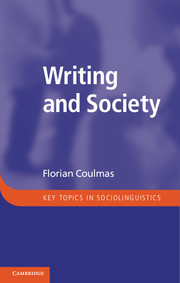Book contents
- Frontmatter
- Contents
- List of illustrations
- List of tables
- Preface
- Acknowledgements
- 1 The tyranny of writing and the dominance of vernacular speech
- 2 The past in the present and the seeds of the public sphere
- 3 Written and unwritten language
- 4 Literacy and inequality
- 5 The society of letters
- 6 Writing reform
- 7 Writing and literacy in the digitalized world
- Notes
- Bibliography
- Index
2 - The past in the present and the seeds of the public sphere
Published online by Cambridge University Press: 05 February 2013
- Frontmatter
- Contents
- List of illustrations
- List of tables
- Preface
- Acknowledgements
- 1 The tyranny of writing and the dominance of vernacular speech
- 2 The past in the present and the seeds of the public sphere
- 3 Written and unwritten language
- 4 Literacy and inequality
- 5 The society of letters
- 6 Writing reform
- 7 Writing and literacy in the digitalized world
- Notes
- Bibliography
- Index
Summary
Writing is not a neutral and autonomous medium.
(Thomas 1992: 74)Writing in the marketplace
The agora was the stage upon which communal life in the ancient Greek city-states unfolded, the epitome of a public place where people from all walks of life met in pursuit of their daily affairs. Primarily devoted to commercial transactions, the market place was also used at times for religious celebrations, rituals of various sorts, exercising justice, and political rallying or casting votes. There were both casual encounters and organized gatherings in the market place, which was associated with typical forms of communication, such as bargaining, haggling over prices, exchanging information, gossiping or discussing current events, but also making public announcements. The agora tended to be noisy, populated as it was by vendors, fishmongers, vintners, cloth merchants and shoemakers offering their merchandise and services while the town criers were stalking up and down the square. Medics and charlatans gave advice and philosophers attracted an audience by offering their views on the meaning of life. The magistrate convened hearings on the market place; the crowd that gathered there was an audience, rather than a readership. Yet, much of what we know about the ebb and flow of the exchange of goods, people and ideas on the Athenian agora has come down to us in the form of a large number of inscriptions painted or scratched on various everyday objects (Harris 1989). For writing, too, was becoming part of the ‘media mix’ of the ancient market place. These early expressions of popular Greek literacy go back to the eighth century BCE.
- Type
- Chapter
- Information
- Writing and SocietyAn Introduction, pp. 19 - 38Publisher: Cambridge University PressPrint publication year: 2013



